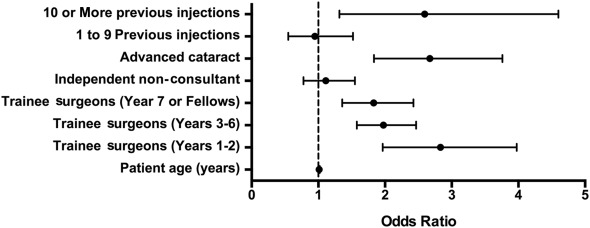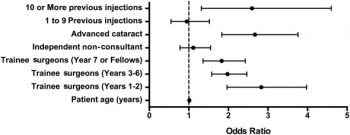In this multicenter, national electronic medical record database study, Dr. Lee and his coauthors investigated whether previous intravitreal therapy is a predictor of posterior capsule rupture during cataract surgery. Posterior capsule rupture occurs in approximately 1.9% to 2.1% of cataract surgeries and is the only potentially modifiable risk indicator for visual loss after cataract surgery. There are many known risk factors for posterior capsule rupture, but the significance of previous intravitreal therapy, an increasingly common treatment for several ophthalmic conditions, as a risk factor for this complication of cataract surgery is unknown.
To answer this question, anonymized data were extracted from the electronic medical record systems of multiple medical centers in the United Kingdom with recorded data on both cataract surgery and intravitreal injections. Data were available on 65,836 cataract operations, and of these, there were 1935 eyes that had received intravitreal therapy prior to surgery (2.9%). Most of these injections (12,731) were anti-VEGF injections (ranibizumab, bevacizumab, aflibercept, pegaptanib), but some (172) were corticosteroid injections (triamcinolone, dexamethasone, fluocinolone).

The authors found that for those eyes with no history of intravitreal therapy, the overall posterior capsule rupture rate was 1.86%, while for those with previous intravitreal therapy the overall rate was 2.22%. The likelihood of posterior capsule rupture was estimated to be 1.04 times higher per injection or 2.59 times higher for those with 10 or more previous intravitreal injections, after adjusting for patient age, advanced cataract, and surgeon grade (a measure of experience). These results suggest that there may be a threshold effect or an unaccounted common risk factor or subgroup that is more at risk.
Possible mechanisms through which intravitreal therapy could increase the risk of posterior capsule rupture include inadvertent zonular trauma either directly or due to local scleral deformation at the time of injection or inadvertent crystalline lens capsule trauma. The authors note that in the United Kingdom, intravitreal therapy increasingly is being administered by health care professionals other than doctors to help meet clinical demand, which raises the question of whether less experienced clinicians may be more likely to cause such inadvertent trauma when administering these injections. Further analysis is still needed to determine the exact mechanisms associated with intravitreal injections that cause the eye to become more susceptible to posterior capsule rupture during cataract surgery, but this study sheds light on an important risk factor that should be taken into consideration as intravitreal therapy is more widely used.
Lee AY, Day AC, Egan C, Bailey C, Johnston RL, Tsaloumas MD, Denniston AK, Tufail A. Previous Intravitreal Therapy Is Associated with Increased Risk of Posterior Capsule Rupture during Cataract Surgery. Ophthalmology. 2016 Jun;123(6):1252-6. doi: 10.1016/j.ophtha.2016.02.014. Epub 2016 Mar 18. PubMed PMID: 26996340.

